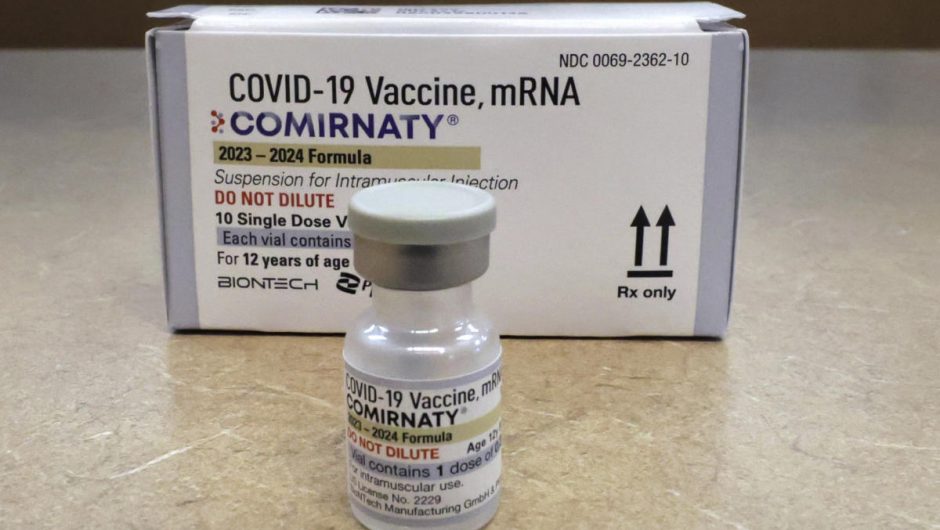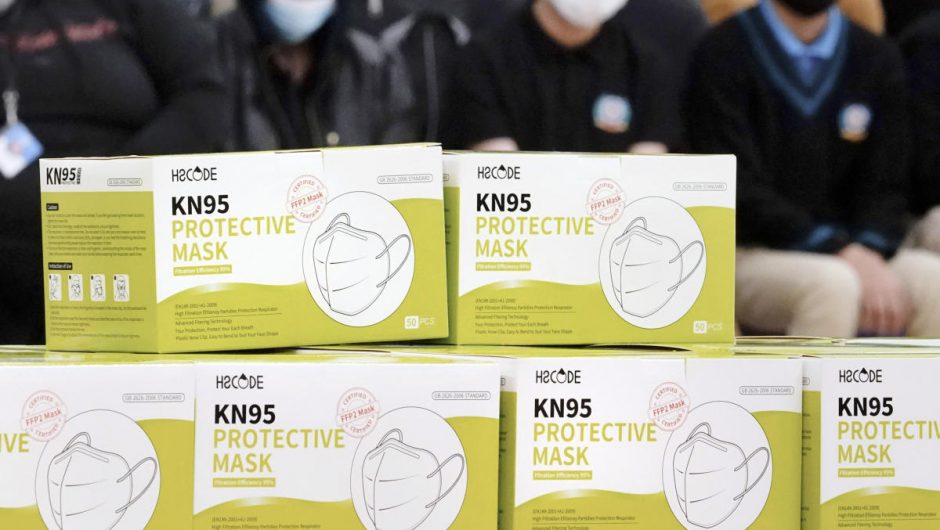[ad_1]
Oct. 17—On Monday, nurse Michele Brown won’t be working in the emergency department of Asante Ashland Community Hospital.
Instead, she’ll be on administrative leave for refusing to follow a state mandate that all Oregon health care and K-12 school workers and volunteers be fully vaccinated against COVID-19 by Oct. 18 or seek a medical or religious exception.
Brown said Asante granted her a religious exception, but the accommodation it gave her was to place her on administrative leave.
“I love what I do. I don’t love it enough to sacrifice my medical freedom,” said Brown, who has decades of experience as a nurse.
Brown said she’s prayed extensively about the issue.
“God has me on this path, and he has a plan. I don’t understand it, but I’m going to do it,” she said.
Brown said she’s not an anti-vaxxer. She’s been vaccinated against other infectious illnesses, including the flu. She also doesn’t deny that COVID-19 is real. She’s seen the suffering of hospital patients with COVID-19.
Brown said people with underlying health problems should get vaccinated against COVID-19. But she said her healthy lifestyle and years of exposure to germs and viruses at the hospital have given her a strong immune system.
Although people with medical problems are more likely to become seriously ill or die from COVID-19, the virus has also struck down strong, healthy people across Oregon and the nation.
To her knowledge, Brown said she hasn’t had COVID-19 herself.
She believes she’s at such low risk of serious consequences from COVID-19 that, for her, it’s not worth facing potential risks from vaccination.
Brown said she’s not willing to get injected with COVID-19 vaccines because they use technology that is new for vaccinations.
Many vaccines, including those for the flu and measles, contain a weakened or small part of a virus. The body responds by making antibodies that can fight off a future invasion of viruses, according to the federal Centers for Disease Control and Prevention.
Story continues
The Moderna and Pfizer COVID-19 vaccines using the new messenger RNA technology that don’t contain COVID-19 viruses. Instead, they teach the body’s cells to make tiny spikes of protein like the spikey protrusions on the surface of COVID-19 viruses. The immune system recognizes the spikes as foreign and makes antibodies to defeat them. If real COVID-19 viruses later invade the body, the immune system has a jump start in attacking those viruses, according to the CDC.
The Johnson & Johnson version uses a different approach to teach the body to make the spikes of protein. It injects a weakenend adenovirus vector that carries the genetic code for the spike protein, according to the U.S.Food and Drug Administration.
Brown said she thinks it’s too early to tell if COVID-19 vaccines will cause long-term harm.
“Three years from now, I hope I’m totally wrong and there are no untoward effects. I’m not willing to take those risks,” she said.
She fears a COVID-19 vaccination could change how her body responds to viruses in the future in unpredictable ways.
Brown pointed to the example of a botched dengue fever vaccination program in the Philippines as an example of the risk of new vaccines.
According to news reports, starting in 2016 more than 800,000 children in the Philippines received a dengue fever vaccination that increased the chances that their blood vessels would leak plasma if they ever caught dengue fever. The leakage was rare, but it could happen in kids who had never had dengue fever before being vaccinated.
The vaccination campaign moved forward despite warnings from a dengue fever expert about the risks. Estimates on the number of children who died range wildly from 10 to 600, according to news reports.
The dengue fever vaccine can now be used only in children who’ve already had dengue fever.
The debacle damaged trust in all vaccinations so much in the Philippines that vaccination rates dropped. The country suffered a measles outbreak in 2019 that sickened 26,000 people and killed more than 355, according to news reports.
The Philippines also suffered a polio outbreak in 2019 after 19 years of being polio-free. A global effort to boost polio vaccinations and control infections has eradicated polio from the country once again, the World Health Organization said.
Brown said she would like Oregon’s governor to rescind the state mandate that health care and education workers get vaccinated.
However, even if the state mandate is lifted, a federal mandate covering workers at organizations with at least 100 employees goes into effect in November. Workers must get vaccinated or have weekly COVID-19 testing.
Last week, Texas Gov. Greg Abbott banned COVID-19 vaccine mandates in the state. His order puts businesses in a quandary, because Abbott doesn’t have the power to stop President Joe Biden’s federal vaccine mandate.
As for the financial hit Brown will take from her decision not to get vaccinated, she said she has enough vacation time built up that she can get paid for 10 weeks at 20 hours per week. That will allow her to keep her family medical insurance for 10 weeks. Her insurance covers her plus her husband and two sons.
“I see the injustice happening. Unless we take a stand, what’s next? That to me is worth the job and the medical insurance. I’ll figure it out. I’ll flip burgers if I have to,” she said.
Brown said many people don’t have a financial buffer and got vaccinated against their wishes. She said she knows a single mom with three kids who cried for days after she got vaccinated in order to keep her job.
Brown said no one will know until Monday exactly how many employees will no longer be working because they didn’t get vaccinated. She predicted already short-staffed medical centers will face an even tougher labor shortage.
Some medical procedures may have to be canceled or postponed, she said.
“Nobody is going to win in this. That is the saddest part about this,” Brown said.
Oregon Gov. Kate Brown announced the coming mandate in the summer when the state was in the midst of an unprecedented surge of COVID-19 cases. Cases skyrocketed the most in Jackson and Josephine counties, where overloaded hospitals had to cancel important surgeries, including many cancer surgeries, to deal with a flood of COVID-19 patients.
The vast majority of people hospitalized with COVID-19 — especially those in intensive care and on ventilators — have been unvaccinated, according to daily updates Asante has been providing during the surge.
The surge in COVID-19 cases and hospitalizations is subsiding, but death rates remain elevated. Hospitals statewide are still under strain, according to Oregon Health Authority data.
Brown said the COVID-19 surge prompted the cancellation of surgeries and other procedures, but the loss of health care workers because of the vaccination mandate could cause a longer period of disruption.
She said she’s frightened that patients won’t get the care they expect or need.
“But at some point, I have to make a decision, and I’ve made my decision,” she said.
As for whether she thinks unvaccinated health care workers endanger vulnerable patients, Brown said both vaccinated and unvaccinated people can spread the virus.
Research so far shows vaccinated people are less likely to become infected with the virus, the CDC said.
However, if they do become infected, research is showing they can still pass the virus to others.
A United Kingdom government-funded study this year found people infected with the highly contagious delta variant of COVID-19 are less likely to pass the virus to their close contacts if they’ve been vaccinated. However, the protective effect was relatively small compared to unvaccinated people, and the benefit shrank after three months.
Another 2021 study by two universities in California found no significant difference in virus levels between vaccinated and unvaccinated people who tested positive for the delta variant. Instead, individuals showed wide variations in their virus levels regardless of their vaccination status or if they had symptoms.
Many studies have shown vaccination is highly effective at preventing severe illness, hospitalization and death from COVID-19 among those who are vaccinated.
Brown said she’s angry at suggestions from some community members that unvaccinated people who fall ill with COVID-19 should be barred from getting an intensive care unit bed.
Some have said people should accept personal responsibility for not getting vaccinated by staying home and not going to the hospital if they get severely ill. Others have said hospitals should prioritize patients who need surgery for cancer and other serious illnesses and turn away unvaccinated COVID-19 patients if there aren’t enough hospital beds and staff to care for everyone.
Brown said hospitals provide care all the time to people who smoke, abuse drugs and alcohol, don’t eat healthy food, don’t exercise and make other harmful lifestyle decisions.
While she wouldn’t deny care to an unvaccinated COVID-19 patient, Brown said people need to understand there is a small risk of death from the virus. She believes the death statistics are inaccurate and too high because people with severe health problems get counted as COVID-19 deaths if they test positive for the virus.
“If you choose not to get vaccinated, you have to understand the risks and be OK with that,” she said.
Brown said the vaccination issue is causing division among health care workers who have stood shoulder-to-shoulder during the pandemic. She said vaccinated health care workers are resentful of those who choose not to get vaccinated.
“There’s a lot of disdain and resentment and a lot of really awful things have been said,” she said.
Brown said she thinks hospitals and other medical facilities will lose a broad range of workers when the vaccination mandate takes effect Monday. Those who are off the job could include people who clean and sterilize equipment and rooms, cafeteria workers, technicians, certified nursing assistants, nurses and more.
“Nobody’s going to know until the 18th. I hear the rumors. It’s not good,” she said.
Reach Mail Tribune reporter Vickie Aldous at 541-776-4486 or valdous@rosebudmedia.com. Follow her on Twitter @VickieAldous.
[ad_2]
Source link




